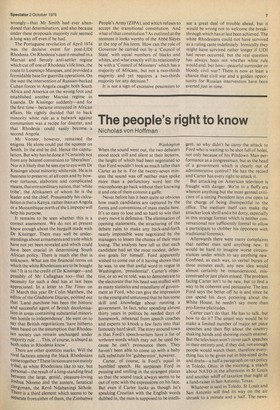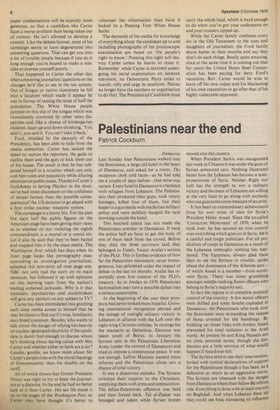The people's right to know
Nicholas von Hoffman
Washington When the sound went out, the two debaters stood stock still and silent at their lecterns, the height of which had been negotiated so that Ford wouldn't look as much taller than Carter as he is. For the twenty-seven minutes the sound was off neither man spoke more than a perfunctory word lest the microphones go back without their knowing it and one of them commit a gaffe.
Never before has it been quite so obvious how much candidates are captured by the forms and conventions of mass media here. It's so easy to lose and so hard to win that every move is defensive. The elimination of opening statements, the structuring of the debate rules to make any back-and-forth nearly impossible were negotiated by the managers to lessen the chance of their man losing. The analysts here tell us that each candidate had set the most modest, defensive goals for himself. Ford apparently wished to come out of it having shown that he was, to use that awful word in vogue in Washington, 'presidential'. Carter's objective, or so we're told, was to demonstrate to the electorate that his head was stuffed with as many statistics and miscellany of government as Ford, who can give the impression to the young and untutored that he has some skill and knowledge about running a government. In fact, after spending almost thirty years in politics he needed days of homework, rehearsal from speech coaches and experts to knock a few facts into that famously hard skull. The story around town is that Ford's speech-writers have a list of verboten words which may not be used because he can't pronounce them. They haven't been able to come up with a baby talk substitute for `gubbermint', however.
Carter, of course, is Ford's equal in bumbled speech. He surpasses Ford in pausing and smiling in the strangest places so that the sound track always seems to be out of sync with the expressions on his face. But even if Carter looks as though he's speaking Croatian with the English words dubbed in, the man is supposed to be intelli gent, so why didn't he carry the attack to Ford who is waiting to be shot full of holes, not only because of his Piltdown Man performance as a congressman, but as the head of a government which is clearly out of administrative control ? He has the record and Carter has every right to attack it.
But attacking on American television is fraught with danger. We're in a fluffy era wherein anything but the most genteel criticism of a sitting President lays one open to the charge of being disrespectful to the office. The medium itself can make the attacker look shrill and a bit dotty, especially in this strange format which is neither conversational nor sufficiently formal to allow a participant to clobber his opponent with traditional forensics.
Afterwards there were many complaints that neither man said anything new. It would be hard to imagine worse circumstances under which to say anything new. Confined, as each was, to verbal bursts of three minutes each, any new idea would almost certainly be misunderstood, misconstrued or just plain missed. The problem facing Carter isn't to be new, but to find a way to be coherent and persuasive. The less Ford says the better off he is and since he can spend his days pottering about the White House, he needn't say more than pro-forma platitudes.
Carter can't do that. He has to talk, but how to do it ? The smart way would be to make a limited number of major set piece speeches and then flip about the country shaking hands and showing mouth enamel. But the television won't cover such speeches in their entirety and, if they did, not enough people would watch them, therefore everything has to be given out in bite-sized dribs and drabs—a half a paragraph on tax policy in Toledo, Ohio, in the morning, a snatch about NATO in the afternoon in St Louis and another whiff of taxation that night at a fund-raiser in San Antonio, Texas.
Whatever is said in Toledo, St Louis and San Antonio will find its way on the air shrunk to a minute and a half. The news paper condensations will be scarcely more generous, so that a candidate like Carter faces a worse problem than being taken out of context. He isn't allowed to develop a context. Like the debate format, most of his campaign seems to have degenerated into answering questions. That can get you into a lot of trouble simply because if you do it long enough you're bound to make a mistake or express yourself poorly.
That happened to Carter the other day when answering journalists' questionson the changes he'd like to see in the tax system. Out of fatigue or native clumsiness he fell into a locution which made it appear he was in favour of raising the taxes of half the population. The White House people jumped on this slip of the tongue which was immediately corrected by other news dispatches and, like a chorus of kindergarten children, leapt up and down shrieking, 'You said it, you said it. You can't take it back.'
Ford, shielded by the panoply of the Presidency, has been able to hide from the media somewhat. Carter has lacked the speed to outrun the reporters, the guile to outfox them and the guts to kick them out of his house. The result is that he has subjected himself to a scrutiny which can only cost him votes and popularity while diluting attention on public issues. Thanks to Carter's foolishness in letting Playboy in the door, we've had more discussion on the sinfulness of sexual fantasy than the possible consequencesof the US decision to go ahead with a first strike nuclear weapons system.
The campaign is a loony bin. For the past five days half the public figures on the American stage have been giving their views as to whether or not violating the eighth commandment is a mortal or a venial sin. Let it also be said that they've been baited and trapped into it by the mass media. The Washington Post, which has days when its front page looks like pornography masquerading as investigative journalism, splashed this non-story all over page one. NBC not only had the story on its main newscast, but followed it up with opinions on this burning topic from the nation's leading ordained jackasses. Why is it that ministers, psychiatrists and stockbrokers will give any opinion on any subject to TV?
Carter has been intimidated into granting such close media access to himself that he may be about to find out it's true, familiarity does breed contempt. Besides, who wants to talk about the danger of relying too heavily on nuclear-generated electricity if the candidate is damn fool enough to discuss whom he's thinking about during coitus with Mrs Carter and whether either or both are a sin? Goodie, goodie, we know more about Mr Carter's perplexities with the moral theology of homosexuality than his doubts on the tariff.
All of which shows that former President Nixon was right to try to keep the journal ists at a distance. In the end he had no better luck at it than Carter. His sex life made it on to the pages of the Washington Post, so Carter may have thought it's better to volunteer the information than have it leaked by a Peeping Tom White House butler.
The demands of the media for knowledge of everything about the candidate up to and including photographs of his proctoscopic examination are based on 'the people's right to know.' Pressing this right will destroy Carter unless he learns to resist it. Remember while Carter is detained undergoing his rectal examination on network television, no Democratic Party exists to march, rally and urge its positions. Parties no longer have the numbers or organisation to do that. The Presidential Candidate must carry the whole load, which is hard enough to do when you've got your underpants on and your trousers zipped up.
While the Carter family confesses every sin in the Old Testament to the sons and daughters of journalism, the Ford family shove butter in their mouths and say they don't do such things. Really quite amazing, since at the same time it is coming out that for years the United States Steel Corporation has been paying for Jerry Ford's vacations. Rev. Carter would be wise to leave off his mea culpas and his blackening of his own reputation to go after that of his highly vulnerable opponent.



































 Previous page
Previous page